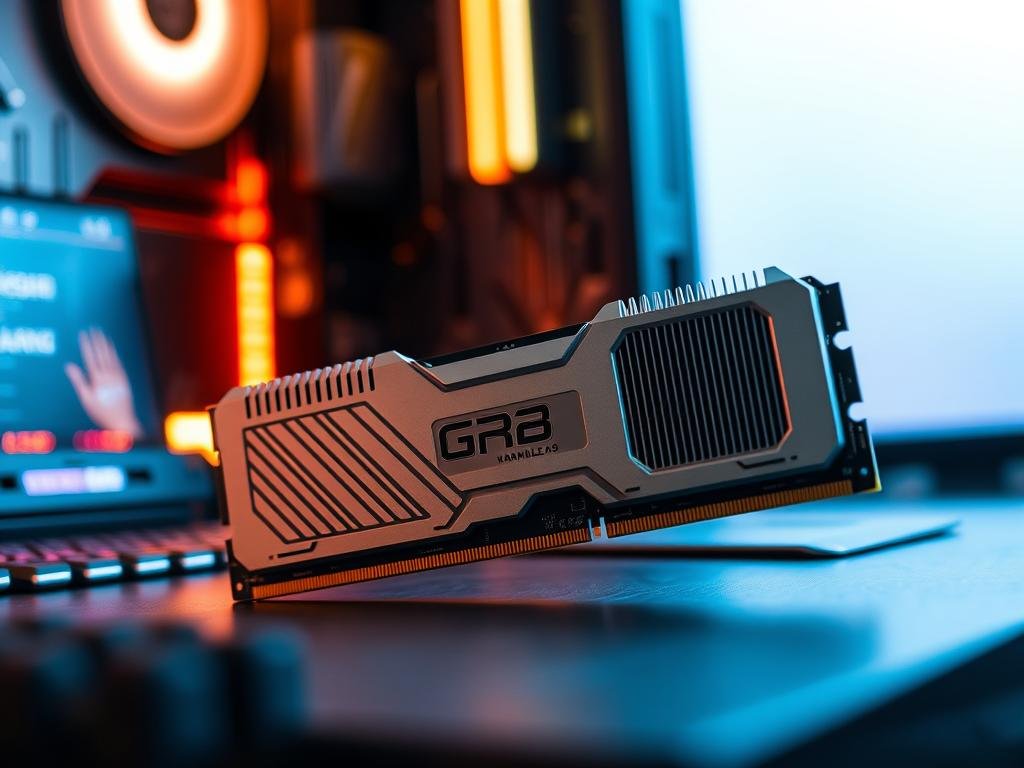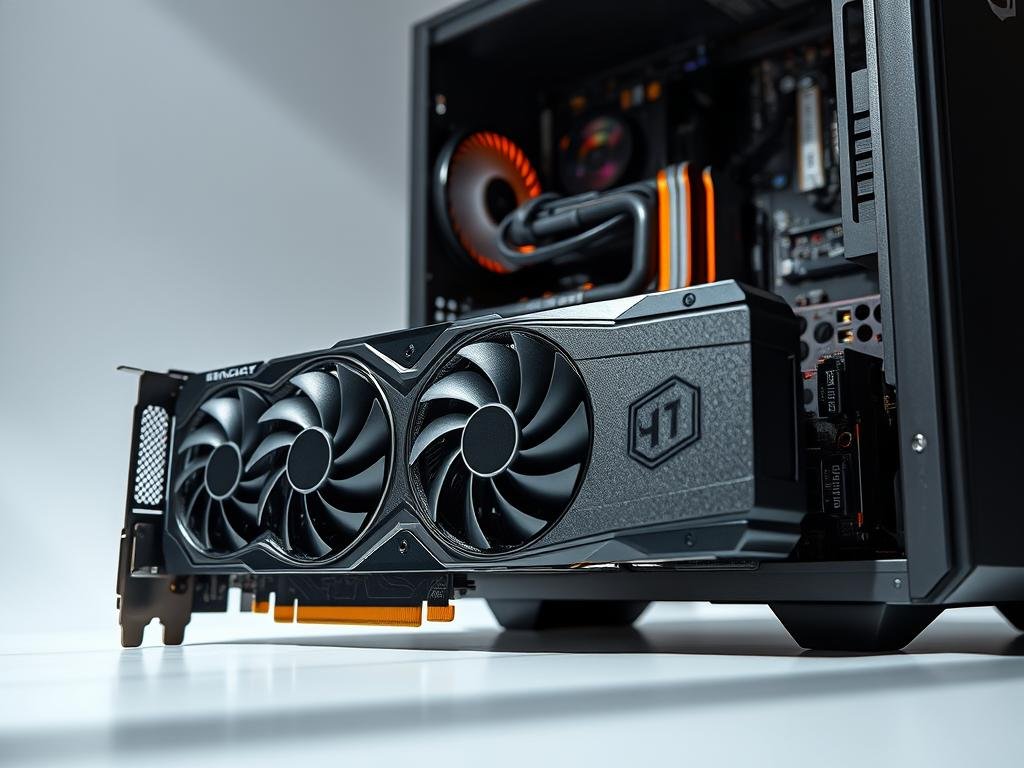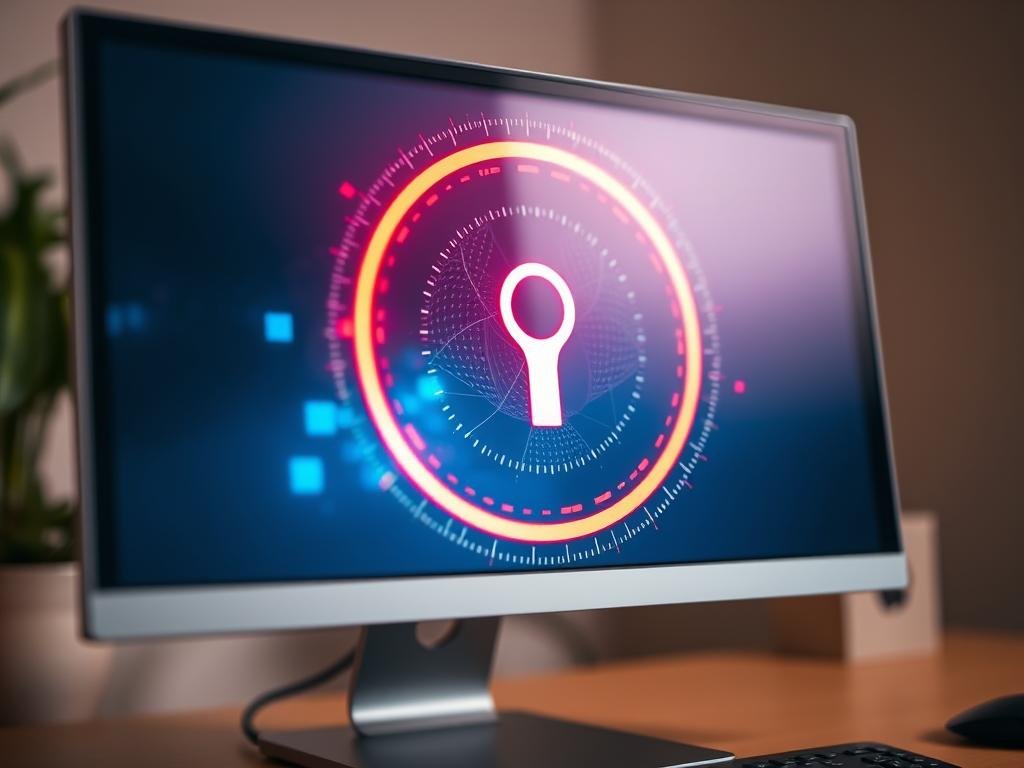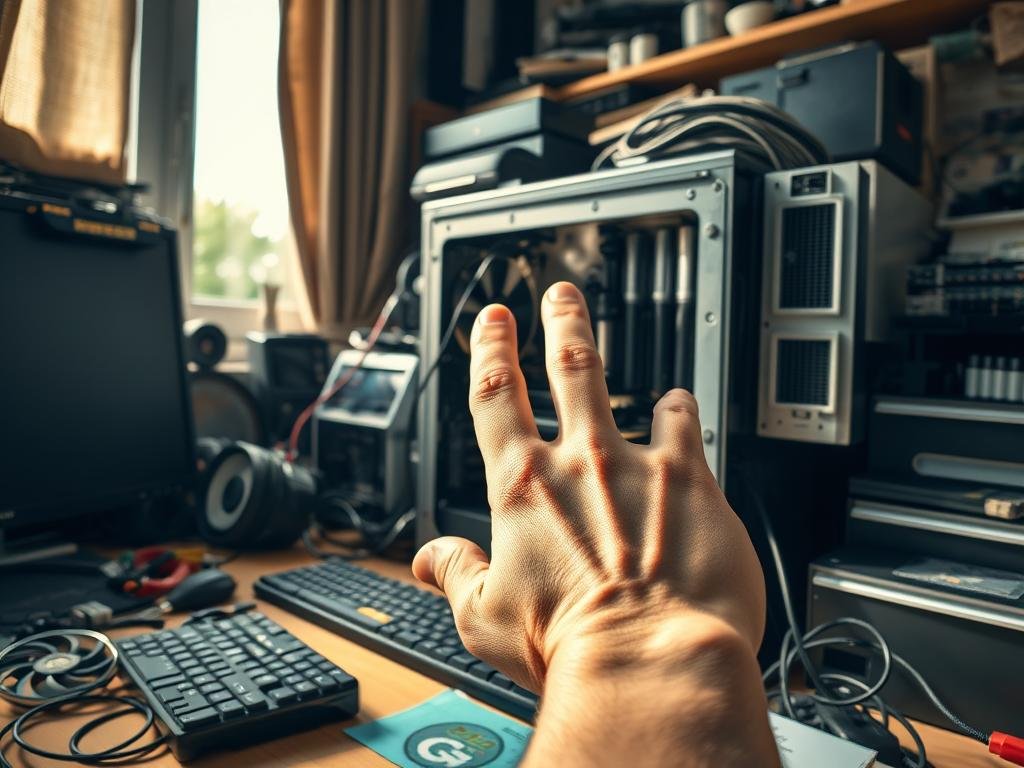Are you tired of your slow gaming computer ruining your gaming fun? You’re not alone. Millions of gamers struggle with this problem. But, the good news is you don’t have to spend a lot to fix it.
Small investments in new hardware can make a big difference. Most upgrades cost less than $100. They can make your computer faster and improve your gaming experience.
Key Takeaways
- Identify the bottlenecks in your current gaming setup.
- Learn which hardware upgrades offer the most significant performance boosts.
- Discover budget-friendly options to upgrade your computer.
- Understand how to prioritize upgrades based on your gaming needs.
- Explore tips for maintaining your computer’s performance over time.
Identify the Bottleneck in Your Gaming PC
To make your gaming PC run better, you first need to find out what’s slowing it down. The performance of your gaming PC is only as good as its weakest part.
When your gaming PC isn’t as fast as you want, it’s key to identify the bottleneck. You need to look at the main parts that affect your PC’s speed.
Check the CPU Performance
The Central Processing Unit (CPU) handles all instructions from the operating system and applications. To see how your CPU is doing, open the Task Manager by pressing Ctrl + Shift + Esc. Here, you can watch the CPU usage and see if it’s too high. High CPU usage during games can mean your processor is the problem.
If your CPU is old or not powerful enough, think about getting a newer one. A modern processor can handle demanding games and apps better.
Analyze GPU Usage
The Graphics Processing Unit (GPU) is key for gaming performance. Use software like MSI Afterburner or the Task Manager’s Performance tab to check GPU usage. If your GPU is always working hard during games, it might be the bottleneck.
To fix this, you can tweak in-game graphics settings or get a more powerful GPU.
Monitor RAM and Storage Speed
Not enough RAM or slow storage can really slow down your gaming. Check your RAM usage in the Task Manager. If you’re always using more than 80% of your RAM, getting more can help.
Also, think about your storage speed. Traditional Hard Disk Drives (HDD) are much slower than Solid State Drives (SSD). Switching to an SSD can make loading times and system speed much better.
Upgrade Your RAM for Better Performance
Upgrading your RAM can make your gaming much better. It helps your system handle the needs of today’s games. This means less lag and better performance overall.
Benefits of Increasing RAM
More RAM brings many benefits for gaming. More RAM means smoother gameplay. It lets your system handle more data at once. This is key for games that need lots of memory to run well.
Also, enough RAM stops your system from slowing down during long gaming sessions. It lets you run more apps in the background without slowing down your games.

Recommended RAM Options
For most gamers, 16 GB of RAM is a good start. But, if you play demanding games or multitask, consider 32 GB or more. Make sure the RAM you choose fits your motherboard.
Popular RAM brands include Corsair, Kingston, and HyperX. Look at the speed (in MHz) and latency (in CAS timings) when picking RAM.
Installation Tips
Installing new RAM is easy. First, make sure your system is off and unplugged. Then, open your PC case to get to the motherboard.
Find the RAM slots and push the clips aside gently. Put the RAM module in, aligning the notches with the tabs, and press down until it clicks.
- Check if the RAM fits your motherboard.
- Hold RAM modules by the edges to avoid static damage.
- Make sure the RAM modules are securely in place.
Revamping Your Storage Solutions
To make your gaming PC faster, think about changing your storage. Moving from a Hard Disk Drive (HDD) to a Solid-State Drive (SSD) can really help. SSDs are quicker than HDDs, which is great for gaming and other tasks.
Importance of SSD Over HDD
SSDs beat HDDs in many ways. They load games faster, respond quicker, and have less delay. For gamers, this means quicker game starts and better play. Kingston’s blog explains how memory and storage affect PC speed.
Steps to Upgrade Your Storage
Switching to an SSD is easy. Just follow these steps:
- Pick the right SSD for you, looking at size and connection type (SATA, PCIe, etc.).
- Backup your files to avoid losing them during the upgrade.
- Copy your old drive to the new SSD, or start fresh with your OS.
- Put the SSD in your PC, either replacing or adding to your storage.
Best Budget SSDs
For affordable SSDs, there are many good choices. Here’s a look at some popular ones:
| SSD Model | Capacity | Read/Write Speed | Price |
|---|---|---|---|
| Kingston A2000 | 1TB | 3200/2000 MB/s | $130 |
| Crucial MX500 | 1TB | 560/510 MB/s | $120 |
| Western Digital Black SN750 | 1TB | 3500/3000 MB/s | $150 |
Upgrading to an SSD makes your gaming PC much faster. It’s a smart move for any gamer, whether you play a little or a lot.
Optimize Your Graphics Card Settings
Want to boost your gaming? Learn how to tweak your graphics card settings. A well-set graphics card can greatly enhance your gaming, cutting down on lag and boosting visuals.
Adjusting In-Game Settings
One easy way to boost your graphics card is by tweaking in-game settings. Lowering graphics quality or turning off fancy features like anti-aliasing can really help. For instance, a game might go from 40 FPS to 60 FPS or more with these tweaks.
- Reduce shadow quality
- Lower texture details
- Disable or reduce anti-aliasing
- Turn off motion blur
Try out these settings to find the sweet spot between looks and performance.
Updating Drivers for Enhanced Performance
Old graphics drivers can slow you down. Keeping your drivers updated is key for top-notch performance. Most systems will automatically check for and install new drivers.
“Keeping your graphics drivers up to date is critical for the best gaming.”
To update, use software from your GPU maker, like NVIDIA GeForce Experience or AMD Radeon Software.
| GPU Manufacturer | Driver Update Software | Update Frequency |
|---|---|---|
| NVIDIA | GeForce Experience | Monthly |
| AMD | Radeon Software | Quarterly |
Overclocking Your GPU Safely
Overclocking can give you a performance boost, but be careful. Pushing it too far can cause overheating, damage, or shorten your GPU’s life.
To overclock safely:
- Use trusted software like MSI Afterburner.
- Start with small increases (5-10 MHz) and check for stability.
- Keep an eye on temperatures to stay within safe ranges.

By following these tips, you can safely push your GPU’s limits and enjoy better gaming.
Improve Cooling to Boost Performance
If your gaming PC overheats, it can slow down, crash, and even damage parts. Keeping it cool is key to top performance.
Signs of Overheating
Spotting overheating signs is the first step to better cooling. Look out for:
- Throttling, where your PC slows down to avoid overheating
- Frequent crashes or shutdowns
- Loud fan noise, showing your cooling system is working hard
“Overheating can significantly reduce your gaming PC’s lifespan and performance.”
Affordable Cooling Solutions
Boosting cooling doesn’t need to cost a lot. Here are some budget-friendly options:
- Upgrade to a better CPU cooler
- Add more case fans for better airflow
- Use a high-quality thermal paste for better heat transfer
Proper Case Ventilation
Good ventilation in your PC case is vital for keeping it cool. Here’s how to do it:
- Make sure your case has enough intake and exhaust vents
- Use fans to push air through your case
- Keep your case clean and dust-free for better airflow
As “good airflow is key to keeping your components cool”, plan your case’s ventilation well.
Clean Up Your Operating System
To make your gaming PC faster, cleaning up your operating system is a great start. Over time, your system can fill up with files you don’t need. This can slow it down a lot.
Keeping your system clean is important. You should regularly delete unnecessary files, update your software, and check for malware. Doing these things helps keep your system running well.
Regular Maintenance Tasks
Regular maintenance is key to keeping your gaming PC fast. Here are some important tasks:
- Disk Cleanup: Getting rid of temporary and system files you don’t need.
- Disk Defragmentation: Making your files easier to access.
- Updating Software: Keeping your system and apps current.
Removing Unnecessary Programs
Many programs on your PC are not needed. Getting rid of them can save space and make your system cleaner. Here’s how:
- Open the Control Panel and go to “Programs and Features.”
- Look through the list of programs and find ones you don’t use.
- Uninstall these programs to free up space.
Removing unused programs not only saves space but also reduces the chance of compatibility problems.
Disk Cleanup Tips
Disk Cleanup is a tool in Windows that helps remove unnecessary files. Here’s how to use it:
- Type “Disk Cleanup” in the Start menu and open it.
- Pick the drive you want to clean (usually the C: drive).
- Choose the types of files you want to delete, like temporary files and recycle bin contents.
By regularly cleaning your disk, you can keep your gaming PC running smoothly.
![]()
By following these steps, you can make your gaming PC much faster. Regular maintenance and cleanup are key for a great gaming experience.
Enhance Your Internet Connection
Improving your internet connection can make your gaming better. A fast and stable connection is key for smooth online gaming. It helps avoid lag and disconnections.
Wired vs. Wireless Gaming
Choosing between wired and wireless internet affects your gaming. Wired connections are faster and more reliable. They cut down on latency and packet loss. Wireless connections, though handy, can face interference and signal issues.
For top gaming, go for a wired Ethernet connection. If you must use Wi-Fi, make sure your router is set for gaming. Also, think about getting a Wi-Fi 6 router for better performance.

Bandwidth Requirements for Gaming
The bandwidth needed for gaming varies by game type and devices connected. For 1080p gaming, 25 Mbps is the minimum. For 4K gaming, you need at least 50 Mbps.
| Gaming Resolution | Recommended Bandwidth |
|---|---|
| 1080p | 25 Mbps |
| 1440p | 35 Mbps |
| 4K | 50 Mbps |
Tips for Reducing Latency
Latency, or ping, is vital for fast gaming. Here are some tips to lower latency:
- Use a wired connection instead of Wi-Fi.
- Close programs and apps that use bandwidth.
- Upgrade your internet plan if needed.
- Optimize your router settings for gaming with Quality of Service (QoS).
- For more tips, check out this resource on reducing lag and increasing internet speed for gaming.
- Also, see mobile gaming resources for more insights.
By using these strategies, you can boost your internet connection. This will improve your gaming and make it more enjoyable.
Explore Affordable Peripheral Upgrades
To take your gaming to the next level, consider investing in affordable peripheral upgrades. Upgrading peripherals such as monitors, keyboards, and headsets can significantly enhance your gaming experience.
The Impact of a Gaming Monitor
A good gaming monitor can greatly improve your gaming experience by providing a smoother and more responsive display. When choosing a gaming monitor, consider factors such as refresh rate, response time, and resolution.
For example, a monitor with a high refresh rate of 144Hz or higher can reduce screen tearing and provide a smoother gaming experience. According to a review by PCMag, “a high refresh rate is essential for fast-paced games.”
“A high refresh rate is essential for fast-paced games.”
| Feature | Importance | Recommended Spec |
|---|---|---|
| Refresh Rate | High | 144Hz or higher |
| Response Time | Medium | 5ms or lower |
| Resolution | High | 1080p or higher |
Keyboard and Mouse Upgrades
Upgrading your keyboard and mouse can also enhance your gaming experience. Look for keyboards with customizable backlighting and macro keys, and mice with high-precision sensors and adjustable DPI.
For instance, a gaming keyboard with N-key rollover ensures that every key press is registered, even in intense gaming sessions. A gaming mouse with adjustable DPI allows you to switch between precision and speed.
Headsets That Enhance Immersion
A good gaming headset can immerse you in the game with 3D audio and crystal-clear sound. When choosing a gaming headset, consider factors such as sound quality, comfort, and microphone quality.
- Look for headsets with 7.1 surround sound for an immersive experience.
- Choose headsets with comfortable ear cushions and adjustable headbands.
- Consider headsets with noise-cancelling microphones for clear communication.
By exploring these affordable peripheral upgrades, you can significantly enhance your gaming experience without breaking the bank.
Look into Budget-Friendly Gaming Accessories
You can make your gaming better without spending a lot. There are many affordable accessories out there. They can improve your gaming experience or make your computer run smoother.
Adding a Gamepad
A gamepad is a great addition to your gaming setup. Gamepads offer a more relaxed gaming experience and are comfy for long gaming sessions. Choose a gamepad that fits your gaming platform and games.
Using a Gaming Chair Effectively
A gaming chair is more than just a seat. It can make gaming more comfortable and better. Look for a chair with good lumbar support and adjustable features for long gaming sessions. Some chairs even have cooling and vibration features.
VR Accessories That Don’t Break the Bank
Virtual Reality (VR) gaming is getting popular, and you don’t have to spend a lot to start. Check out affordable VR accessories like controllers and headsets. They can make your VR gaming better without costing too much.
| Accessory | Price Range | Key Features |
|---|---|---|
| Gamepad | $20-$50 | Ergonomic design, wireless connectivity |
| Gaming Chair | $100-$300 | Lumbar support, adjustable armrests, cooling features |
| VR Accessories | $30-$100 | Controllers, headsets, motion sensors |
When to Consider a Full PC Upgrade
You’ve tried optimizing your RAM, upgrading storage, and tweaking graphics. But your gaming PC is slow. It’s time to think about a full PC upgrade to boost speed and fix lag.
Performance Needs Assessment
Check how well your PC runs in modern games and apps. If it can’t handle the basics, a full upgrade might be needed. Think about the cost and benefits of upgrading parts versus getting a new system.
Cost-Effective Upgrade Options
Look for cheaper ways to improve your PC before a full upgrade. Upgrading your CPU, GPU, or RAM can make a big difference. Companies like NVIDIA, AMD, and Corsair have affordable options to refresh your gaming PC.
Timing Your Upgrade
Watch for sales like Black Friday or Cyber Monday for discounts on PC parts or gaming PCs. Upgrading at the right time can save you money and get you the best deal.
FAQ
How do I identify if my gaming PC is slow due to a hardware or software issue?
Check CPU, GPU, and RAM usage in Task Manager. If they’re not being used much, it might be software. If not, you might need to upgrade your hardware.
What is the best way to upgrade my RAM for better gaming performance?
First, check if your motherboard can handle different RAM types and speeds. Then, pick the right RAM size for your games. Follow the installation guide for the best results.
How do I know if I need to upgrade my storage to an SSD?
If games load slowly or your PC feels slow, think about an SSD. SSDs are faster and make your system more responsive than HDDs.
Can I overclock my GPU to improve gaming performance, and is it safe?
Yes, overclocking can boost your GPU’s performance. But, do it carefully. Monitor temperatures and use software to avoid damage.
How can I improve my gaming PC’s cooling system on a budget?
Start with good case ventilation. Add affordable fans or a better CPU cooler. Clean your PC regularly to keep it cool.
What are some regular maintenance tasks to keep my operating system optimized for gaming?
Update your OS and drivers often. Remove unused programs and clean your disk. These steps keep your system running well.
Should I use a wired or wireless connection for gaming, and why?
Wired Ethernet is better for gaming because it’s faster and more stable. But, if you prefer wireless, make sure your router is set up for gaming and use Wi-Fi 6 for better speed.
How can I reduce latency and improve my online gaming experience?
Use a wired connection and close programs you don’t need. Make sure your internet plan is fast enough for gaming. A gaming VPN or router settings can also help.
Are gaming monitors worth the investment for a better gaming experience?
Yes, gaming monitors offer high refresh rates and fast response times. They make your games smoother and more enjoyable.
When should I consider a full PC upgrade instead of upgrading individual components?
Upgrade your whole PC if it’s really old or if upgrading parts costs too much. Think about what you need and look for affordable upgrades first.
What are some budget-friendly gaming accessories that can enhance my gaming experience?
Look for gamepads, gaming chairs, and VR accessories that won’t break the bank. They can make your gaming more comfortable and immersive.
How often should I clean my gaming PC to prevent overheating and maintain performance?
Clean your PC every 3-6 months to avoid dust buildup. Use compressed air to gently clean fans and other parts.
